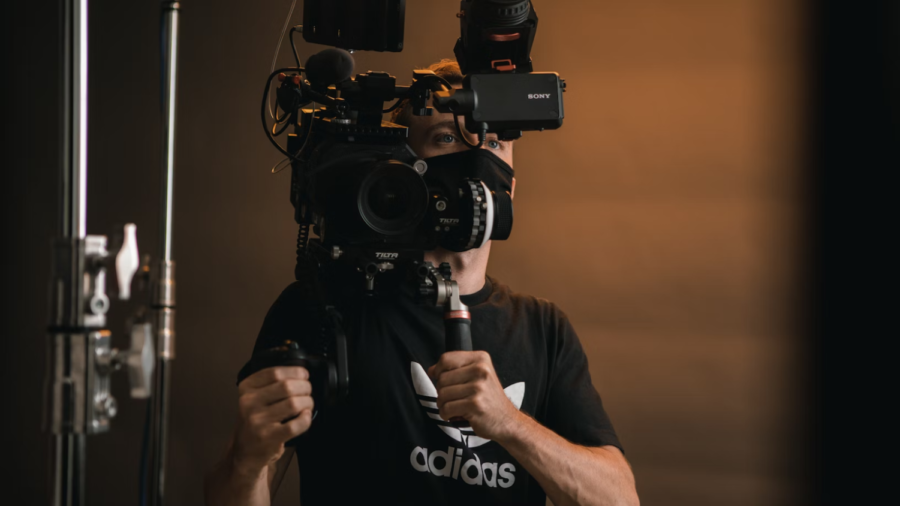Celebrity Documentaries and the Glamor of Fame
In our age of celebrity-obsessed culture, more and more documentaries showcasing a celebrity throughout specific periods of their life are being released, with varying levels of authenticity.
Tasnim Haque ’24 has noticed an increase in the number of celebrity documentaries in recent years. “I think it is due to the growing use of social media. On top of that, the pandemic has made people more invested in the lives of celebrities.”
We are most used to seeing celebrities as they appear on the screen with glossy hair and perfectly applied makeup. Their seemingly perfect lives are so close yet so far. But recently, even though we continue to see them on the screen, celebrities have taken an interest in showing a more vulnerable side of themselves. The glossy hair becomes messy, and the makeup is sparse, if applied at all. Their lives seem a lot less perfect, and a lot closer to us.
In recent years, it has certainly felt like every celebrity is getting their own documentary. In 2022 alone we saw the releases of Olivia Rodrigo: Driving Home 2 U (A Sour Film), Janet Jackson., Jeen-yuhs: A Kanye Trilogy, Selena Gomez: My Mind & Me, among several others.
While all of these films fall under the umbrella of celebrity documentaries, they all serve different purposes and contain divergent techniques. Some are mere concert films, meant to give fans a glimpse into tour life or provide a preserved relic of this artist’s performance, such as the following documentaries: One Direction: Where We Are – The Concert Film (2014), or Billie Eilish’s Happier Than Ever: A Love Letter to Los Angeles (2021). Other documentaries are meant to be a deeply personal, raw, and intimate look into an artist’s personal life, aiming to disprove the narratives adopted by the public in favor of showing the artist as a more relatable person. Sometimes these documentaries are made in collaboration with the artist, such as Taylor Swift’s Miss Americana or Demi Lovato: Dancing With the Devil, while others are made by an outside source, like Amy about Amy Winehouse or Framing Britney Spears.

There is no shortage of these types of films, and they have been released more frequently in the past couple of years, meaning they must be successful. But why? What is the appeal of these types of movies?
In order to answer this question, we must first define what a celebrity is. There are currently many ideas surrounding the defining traits of a celebrity, with one of the foremost being established by Richard Dyer in 1979. Dyer believed that being a celebrity entailed a paradoxical condition, in which you are both extremely relatable and someone an audience can identify with, while also being someone seemingly untouchable, beyond human, someone an audience would aspire to be like.
Chris Rojek, a Professor of Sociology at City University, outlined a more recent definition, making the case that there are three different types of celebrities. There is the ascribed celebrity, who gains fame through their family relations (i.e. Paris Hilton, the royal family), the achieved celebrity, who gains fame through their talent and accomplishments (i.e. Taylor Swift, Lionel Messi), and the attributed celebrity, who gains fame through media exposure (i.e. the Kardashians, Tyra Banks).
Celebrity documentaries, with some exceptions, generally focus on achieved celebrities, which connect back to our human interest in someone that we look up to and aspire to be like. This explains why we see so many documentaries being released about people like Billie Eilish and Selena Gomez, people who are generally liked by the public, made their own fame, and are extremely successful.
Graeme Turner, a Professor of Cultural Studies at the University of Queensland, views exposing aspects of your personal life as an unavoidable part of being a celebrity. In fact, Turner believes that one becomes a celebrity the moment that the media begins to report on a person’s private life as opposed to just their public career. As such, celebrities may feel pressure to reveal more and more about their private lives in order to stay relevant and increase their fame.
To return to the question of why celebrity documentaries are even made, the obvious answer is that fans just want to see their idols in their day-to-day lives and learn more about them. “People would like watching these types of movies because if someone idolizes another person, there is always going to be some curiosity as to how that idol lives,” said Maliha Chowdhury ’24.
Kiep Leon ’26 expressed a similar sentiment, noting, “You kind of get to see what type of person a celebrity is behind the scenes, and how they came to be who they are.” Many fans of celebrities feel a deep personal connection to whatever celebrity they are following, and wish to feel closer to them, even if that just means watching a celebrity going about mundane tasks.
Gayle Stever, a P.H.D. professor of Social and Behavioral Sciences at Empire State College and SUNY, touched on this phenomenon in an exclusive interview. “One of the things we want to do when we know someone is to learn more about them,” she explained. “This is true of both people in our face-to-face lives but also those we know through media.”
As such, it is perfectly natural to want to learn more about those you know in your life, which, because of social media, can include celebrities. The appeal of celebrity documentaries is simply an extension of this.
These documentaries also make celebrities feel more real, showing us the person behind the celebrity. “The most enjoyable qualities about these documentaries is how they highlight the realness of a celebrity. Documentaries surrounding Taylor Swift showed why she acted the way that she did, and how she had issues with mental health. But she was able to get coverage on how she was doing, and she was able to improve her lifestyle, and to move on,” said Iffath Liaquat ’24.
Trying to reveal very personal and raw details about a person in these types of films is a double-edged sword, as it is hard to tell how genuine these issues are, causing many to be skeptical about them. “I do like watching these types of movies just to get a peek into an idol’s life and get to know them in moments when they’re not necessarily performing or acting. The fact that these are still movies, however, and the celebrities are usually aware of the cameras pointed on them, can sometimes take away from the experience by serving as a reminder that the public eye may never get to see their complete, genuine personality,” said Elizabeth Colón ’23.
Sydney Siskind ’23 had similar concerns about the genre as a whole, stating, “To an extent, I don’t know how much of the documentary is actually true, considering the amount of editing it must go under, as well as the kind of light the directors try to portray the celebrity under. It can seem stilted in certain moments.”
The authenticity of these films is often questioned because many view clips of a celebrity tearfully talking about their struggles as manipulative, or believe that these clips are faked, and are an attempt to get the viewer to feel sympathetic for said celebrity.
While this may have some truth in it, Stever does not see celebrity documentaries as solely an attempt to cash in on parasocial relationships, or one-sided relationships, most often between a celebrity and fan. “Parasocial elements have a less central role in what drives these documentaries. Instead, I think curiosity, interest in the person’s work, or admiration for their character or philanthropy are at work. For example, I know I saw some kind of documentary in the past year or so about Dolly Parton, not someone of whom I am a particular fan, but I have heard a great deal about all she does for charity and was interested to learn about the kind of person she is for that reason. I wouldn’t say I have a close parasocial relationship with her or that this was a factor in why I watched that.”
This sentiment ties back into the appeal of watching a documentary about an achieved celebrity. Even when the film shows some of their lowest, most vulnerable points, you are still watching the life of an extremely successful person, a premise which inspires curiosity and even a chance to live vicariously through this celebrity.
Most importantly, Stever wanted to emphasize that celebrity documentaries, overall, are not harmful. “We can enjoy the work of someone who is very good at what they do (e.g. Josh Groban, whose fans I have studied, and is admired as an exceptional singer), we can aspire to be better people through the examples of people like Keanu Reeves (well known for being both grounded and philanthropic), or we can enjoy the ‘magic’ of having a ‘crush’ on our favorite celebrity (which, in 99% plus of cases, is harmless fun).”
Sydney Siskind ’23 had similar concerns about the genre as a whole, stating, “To an extent, I don’t know how much of the documentary is actually true, considering the amount of editing it must go under, as well as the kind of light the directors try to portray the celebrity under. It can seem stilted in certain moments.”
Monica Reilly is an Editor-in-Chief for ‘The Science Survey.' She has always loved using the art of journalism to educate and connect with people. She...

